How can you update a living room without buying anything new? 7 interior designers share their most simple ideas
Can you improve the look of your living room without spending money? Interior designers say yes you can – here's how

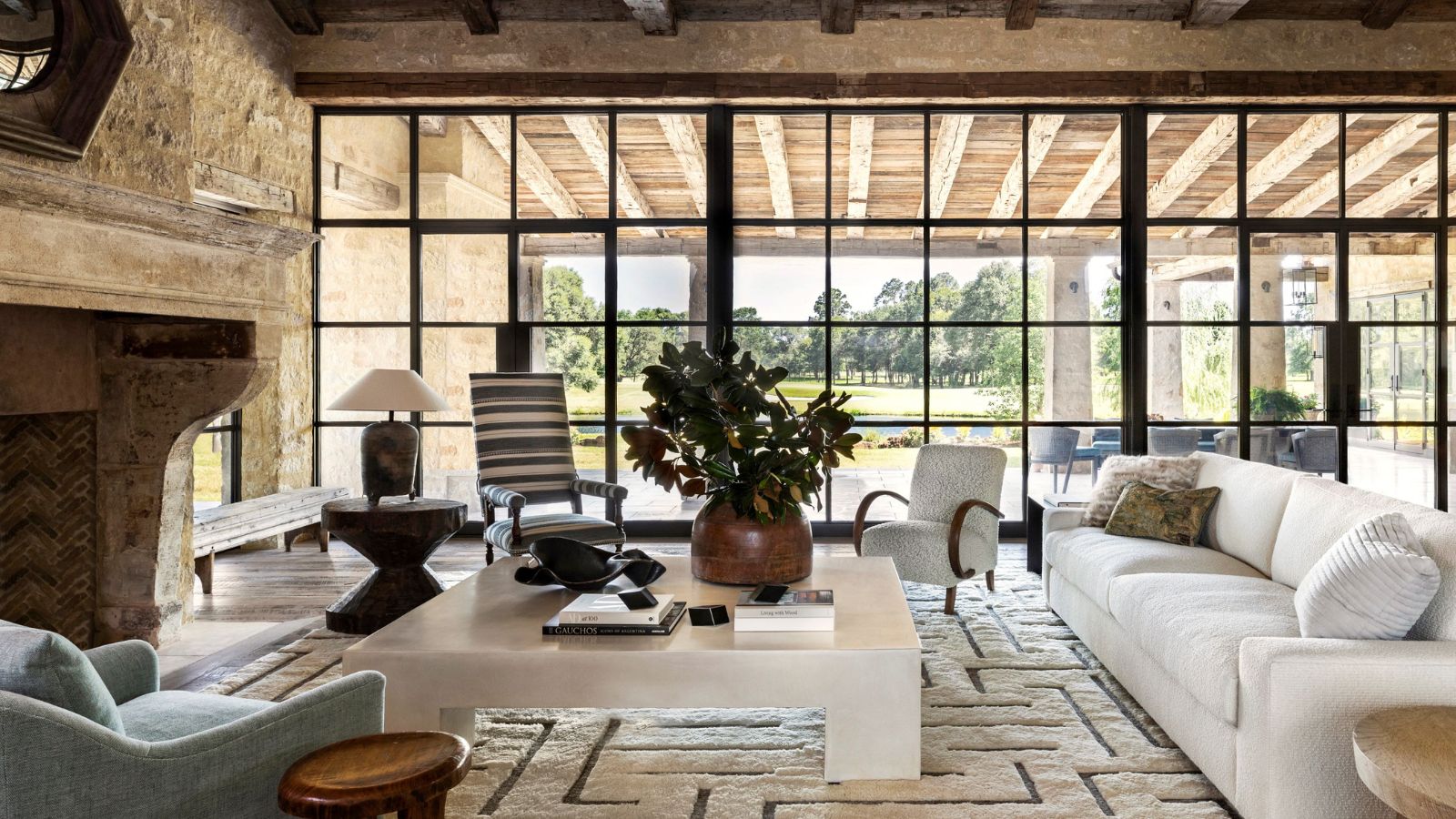
If you're reading this then you're already looking for ways to update a living room without buying anything new. You're maybe asking yourself is that even possible? How can you change your living room without spending money? Well, the interior designers we spoke to aren't short of inspiring living room ideas and are happy to share their tried and tested advice, below, on the ways to update a living room without buying anything new.
As with most aspects of interior design, it starts with a bit of creative thinking. Take a look at the existing space. What is it about your current living room that isn't working for you right now? What's missing? What needs to go? Is there anything glaringly obvious that you can improve with little effort and no cost?
Once you've assessed the existing room and identified its weak points, you're ready to work through the practical advice from our design experts below. Focusing on one aspect at a time, step-by-step, you'll find out how to update your living room without buying anything new. It couldn't be easier, and the transformation will be remarkable, and creative.
How can I update a living room without buying anything new?
The interior designers we spoke to agreed that the first step, before tackling any room makeover, is to declutter and clean. Next, they suggest, looking at rearranging the living room furniture, including bringing pieces in from elsewhere in the house or upcycling items to refresh them.
Consider the room's focal points, coffee tables, mantels, and shelves, and try to give them all a new look. You could create a gallery display of artwork or a curated collection of objects to add another layer of interest to the room. For a budget-friendly finishing touch, put together a fresh, seasonal display of flowers, grasses, branches or leaves.
1. Declutter and deep clean the space
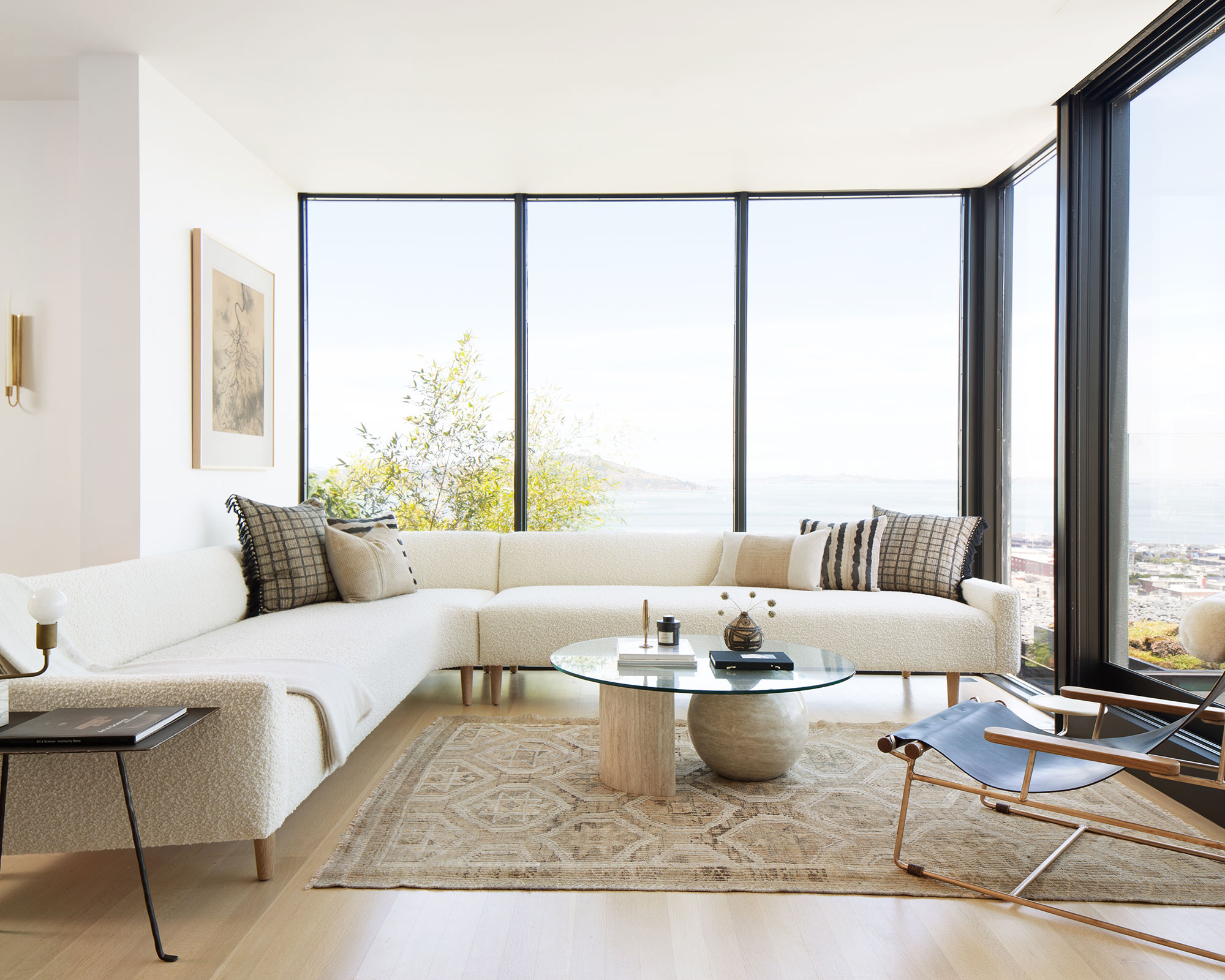
Like any relationship, when we fall out of love with a room it's often worth giving it another chance and showing it some extra TLC. That's why the first step in updating your living room is to declutter and deep clean the space. Decluttering effectively may take a while, particularly if it's not already part of your regular housework routine, but it's time well spent when you want to change your living space. There are various approaches you can use to declutter. It can be very useful to make a living room decluttering checklist.
Designer Tancred Vilucchi of Maison Vilucchi in LA believes that in this instance, when updating a living room without buying anything new, 'Less is more. First of all, move all of the furniture, decorative items and accessories out of the way,' he says. 'Emptying the room and deep cleaning it is a must. There's nothing better than a white canvas so that you can start afresh. It might also be time to sell some items by having a garage sale.'
Design expertise in your inbox – from inspiring decorating ideas and beautiful celebrity homes to practical gardening advice and shopping round-ups.
Özge Öztürk, co-founder of London-based architecture and design studio OZA, emphasizes the importance of assessing your belongings as you declutter. 'We suggest that while decluttering your space you can think once again about which objects do you bond with the most and why they are meaningful to you,' she says. 'So that while you are rearranging your furniture to create a new and exciting layout – or even just reorganizing your shelves, you can prioritize these items in the new setting of your space.'
Which brings us neatly onto our next suggestion for updating a living room without buying anything new...
2. Rearrange the furniture
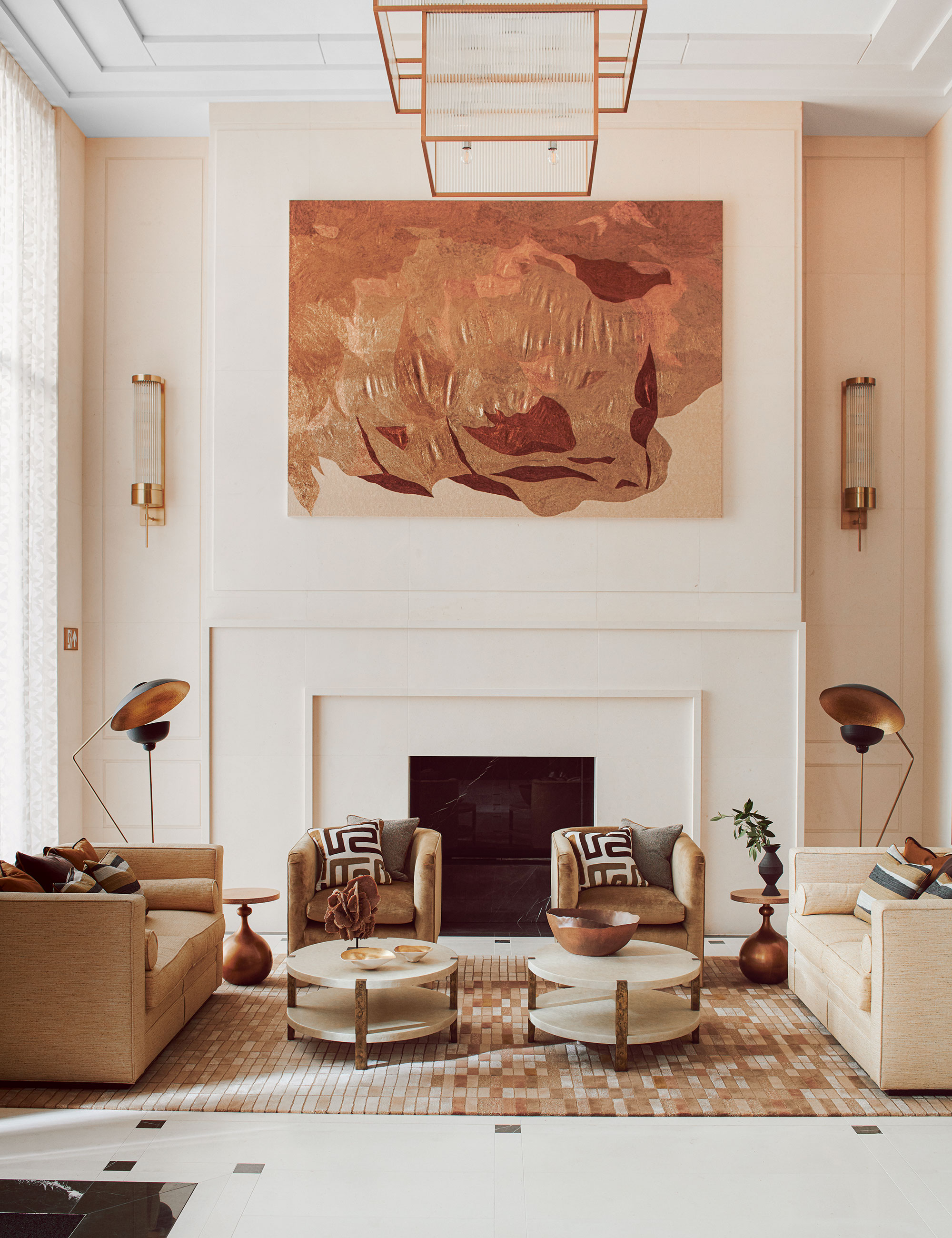
It's amazing how much difference you can make to a living room simply by moving the existing furniture around. Updating your living room layout ideas will not only give you a fresh perspective, but reconfiguring the space can help to make it work better for you on a practical level, too.
In a small living room a more intimate grouping of furniture around the living room fireplace can be effective, or in a larger, open-plan living room try dividing the space up with two or more different seating areas.
Take the opportunity when rearranging your furniture to improve the practicality of the living room, advises NYC-based interior designer Sarah Tract, 'If it isn’t working functionally, switch it up! I find a lot of times when people move in they don’t know how they are going to live in a space yet. So it is only natural to have to move things around to accommodate the nature in which you use your home.'
When you're rearranging furniture, Shaolin Low advises creating 'conversation areas'. 'Consider grouping chairs and sofas to form cozy conversation zones. This can give the room a more inviting and intimate feel without spending a dime,' she says. 'And play around with different furniture arrangements. Try placing the sofa at an angle or moving chairs to different corners. Experimenting with layouts can give the room a fresh look without the need for new furniture.'
Tancred Vilucchi agrees and says 'You can create a whole different scene within the same room, to keep things interesting and functional; it can be easily done while arranging existing furniture different ways. And you can take this process a stage further, by using furniture brought in from another room.'
3. Borrow décor from other rooms
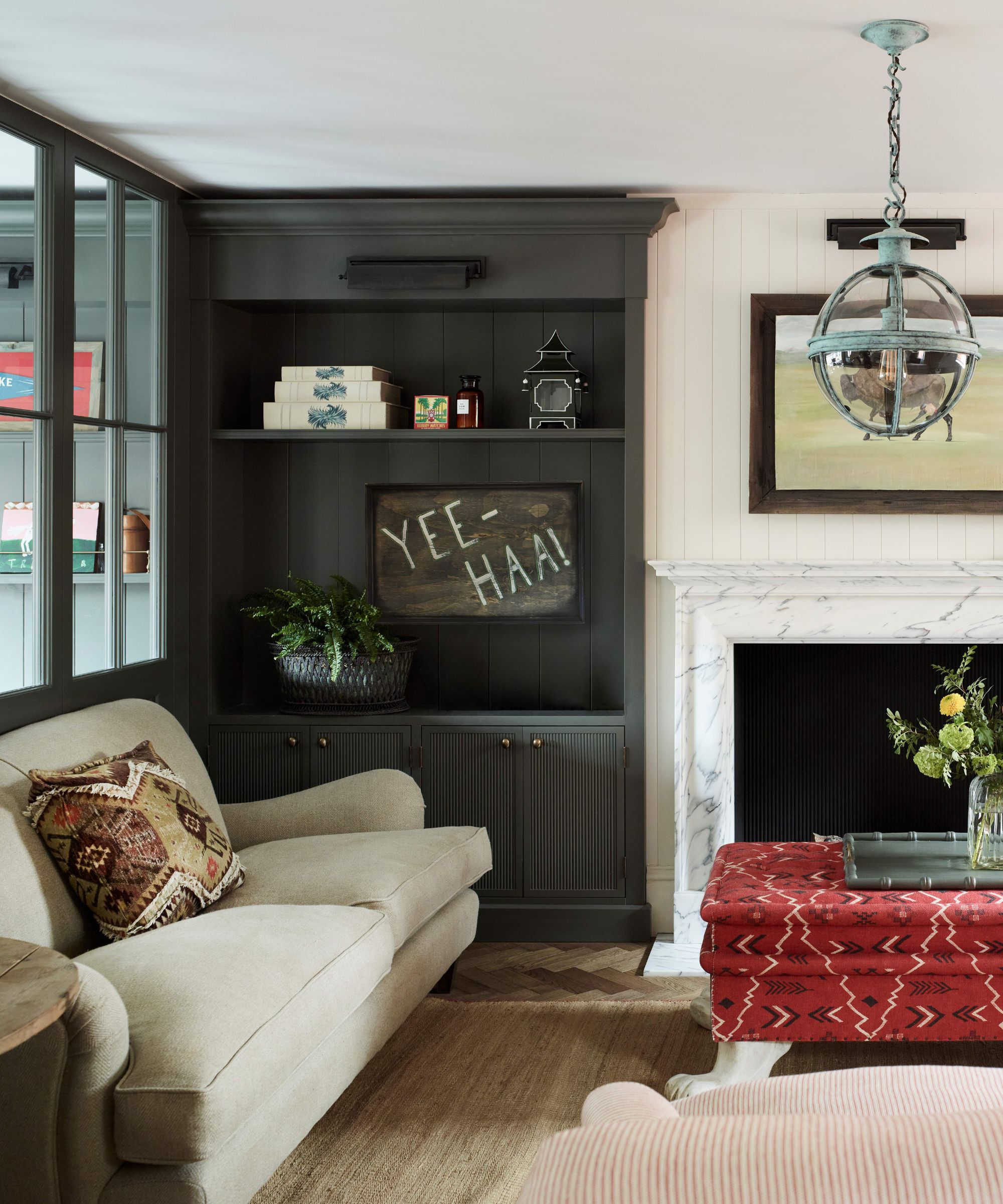
Moving a piece of furniture into the living room from another part of the house will instantly update the space. An accent chair from a bedroom or a side table from the foyer will refresh the look of the room, and of the familiar item you're importing. This doesn't just apply to large pieces of furniture; smaller items such as rugs, lamps, throw pillows and even artwork or vases will all do the trick.
There's no reason why your relocated pieces can't fulfill a different purpose in their new living room home, says Shaolin Low. 'An old dresser could become a TV stand, or a console table could be used as a desk. This not only updates the room but also adds a special touch,' she says.
Lauren Meichtry of Elsie Home advocates regular restyling, as well as moving pieces from another room to update the living room. 'Like spring cleaning, every year I gather literally everything in my house not classified as furniture and restyle,' she says. 'It can be as easy as moving pieces around from, say, your bedroom that would never normally be seen by a guest and give it some life again by styling it in your living room. Or repurpose an empty vase you’ve been keeping on the living room bookshelf by putting it in the powder room with some fresh blooms.'
4. Upcycle or reupholster furniture
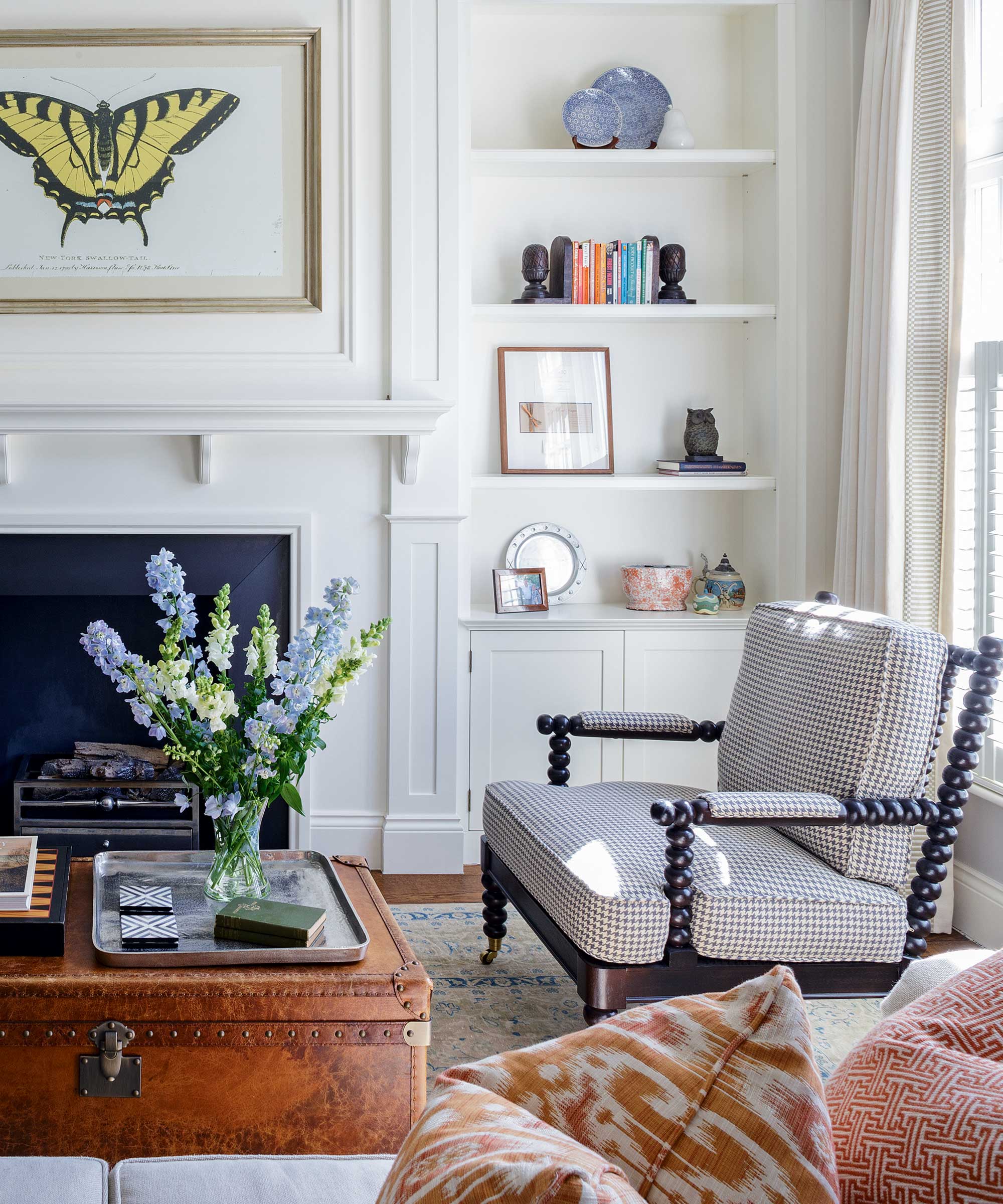
How many of us keep a stash of part-used paint cans just in case they come in handy at some point? Or hoard remnants of fabrics we can't bear to part with? Guilty as charged. Well, if you're looking for ways to update a living room without buying anything new, designer Tancred Vilucchi says it's time to put these things to good use. 'Rather than leaving them in storage forever, we can use leftover fabrics to reupholster a chair or two,' he says, 'or create a new piece of artwork with them, or simply cover old pillows to give a new dimension.'
And as for the unused paint? 'If there's not enough to paint the entire room we could just paint one section of a wall and rearrange furniture accordingly or paint existing bookshelves, built-in cabinets or even a set of furniture, once again to create a fresh new look,' the designer adds.
Another fan of an upcycling paint project, Lauren Meichtry says, 'It can be a really fun way to create new interest in existing furniture. I love to introduce an unexpected splash of color to a space through an antique. It’s such a wonderful juxtaposition and can add a contemporary feel to a traditionally designed space and vice versa.'
You can even upcycle pieces without dipping into paint reserves or fabric stores, just by giving them a new purpose, as Shaolin Low suggests, 'Why not mix and match different pieces to create something new? For example, use old wooden crates as shelves or stack vintage suitcases to create a unique side table. Get creative with the pieces you already have.'
5. Focus on displays – update coffee tables, mantels and bookshelves
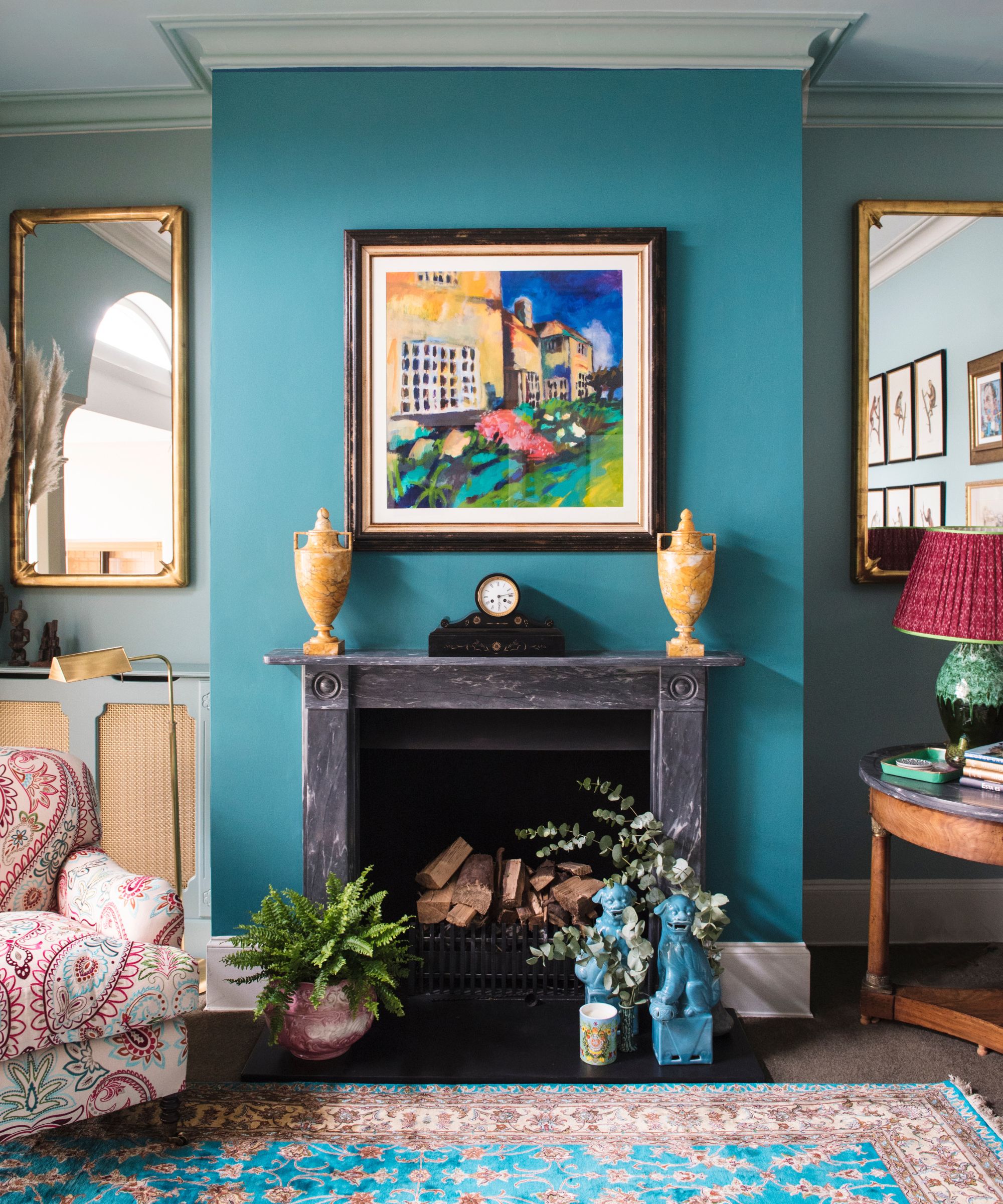
It's time to get down to the details and turn our attention to the living room displays. These are the little styled and curated vignettes we might put together for decorative interest on coffee tables, mantelpieces and shelves.
Shaolin Low is an expert in these smaller style moments. 'Instead of getting rid of decor items,' she says, 'consider rotating them seasonally. This way, you can appreciate your belongings in a new light without overcrowding the space with too many items at once.'
Sarah Tract agrees that the seasonal approach is the way to go: 'I think it’s important to rearrange coffee table decor seasonally. We all need a little refresh and the aesthetic of your home is very important,' she says.
As for coffee table styling ideas, 'Play with books, candles, or decorative trays to add interest,' says Shaolin Low. 'Consider incorporating items from other rooms for a fresh look, or rearrange existing items on the coffee table to create a visually appealing display.'
Finding out how to style a mantelpiece for maximum decorative effect can bring a quick and budget-friendly update for a living room fireplace. Shaolin Low advises incorporating a mix of heights, textures, and colors in the objects you choose to display on the mantel. 'This will give a much more balanced and aesthetically pleasing arrangement,' she says.
The other area of the living room that might be overdue an update is the bookcase. The big lesson in how to style a bookcase is that less is more. Don't overcrowd each shelf with books. Donate books that you won't read again, and weed out paperbacks that don't have visual appeal. Tidy the remainder, keeping larger reference books or beautiful art books lower down on the shelves for ease.
6. Put together a gallery wall with neglected prints
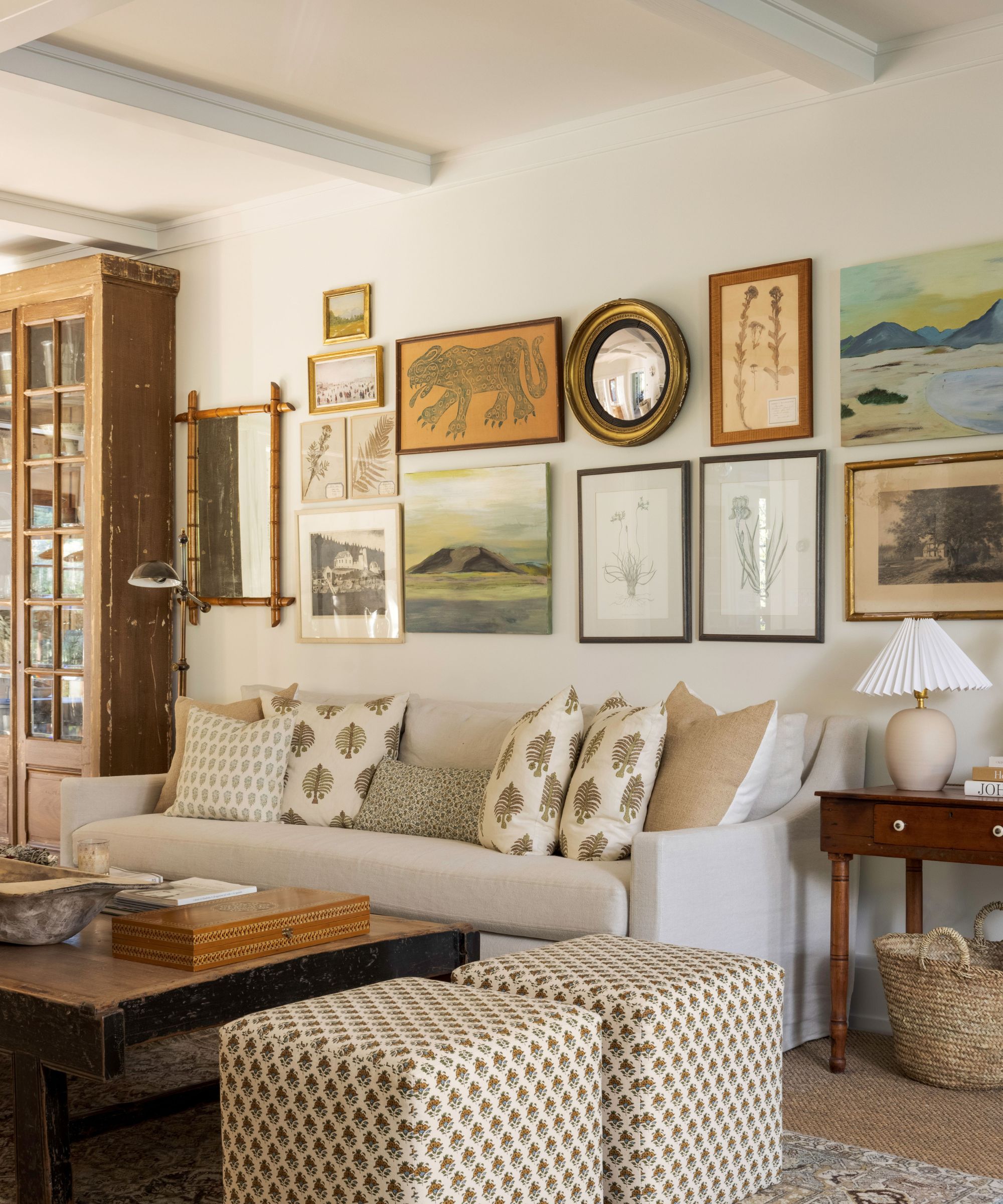
A living room with blank walls will never feel comfortable or welcoming. However, if the artwork on the walls no longer appeals or doesn't suit the style of the room it may be time for a switch around. Bring in framed paintings or prints from elsewhere in the home to change things up a bit.
Or make a real statement by putting together a gallery wall. Unless you're bringing together a selection of ready-framed prints from other rooms, you may have to buy some new frames, but inexpensive wooden frames can always be upcycled or personalized with leftover paint.
Sourcing the 'artworks' themselves, can be done without spending money. Designer Özge Öztürk suggests creating a gallery wall with images from a magazine or from family pictures. 'Ask your relatives or friends if they have some “antique” objects to share with you, or maybe just notes or sketches that they would like to gift to you to hang on your wall,' she adds. 'This would create an eclectic and unique design and, with all the memories and stories belonging to you, would turn your place into your home on a different level.'
The ultimate no-cost artwork tip is to create your own or repurpose existing pieces to update your living room. 'This could involve framing fabric remnants, arranging vintage postcards, or even framing pages from an old book. Get creative with what you already have,' urges Shaolin Low.
Introducing texture and dimension to a gallery wall is a must, says Lauren Meichtry. 'A wall of family photos in matching frames can work,' she says, 'but if you’re looking to create a more dynamic gallery wall, find unusual objects to frame. A kid’s art project, a mountable family heirloom, and a silhouette portrait will all add a touch of the unexpected to the display.'
We love the way the gallery wall, in the picture above, created by interior designer Caitlin Flemming, echoes the palette of the living room, but also of the Californian landscape outside the home. Although the individual pieces of artwork are very distinct, they are linked through color in this way.
7. Forage greenery from your yard
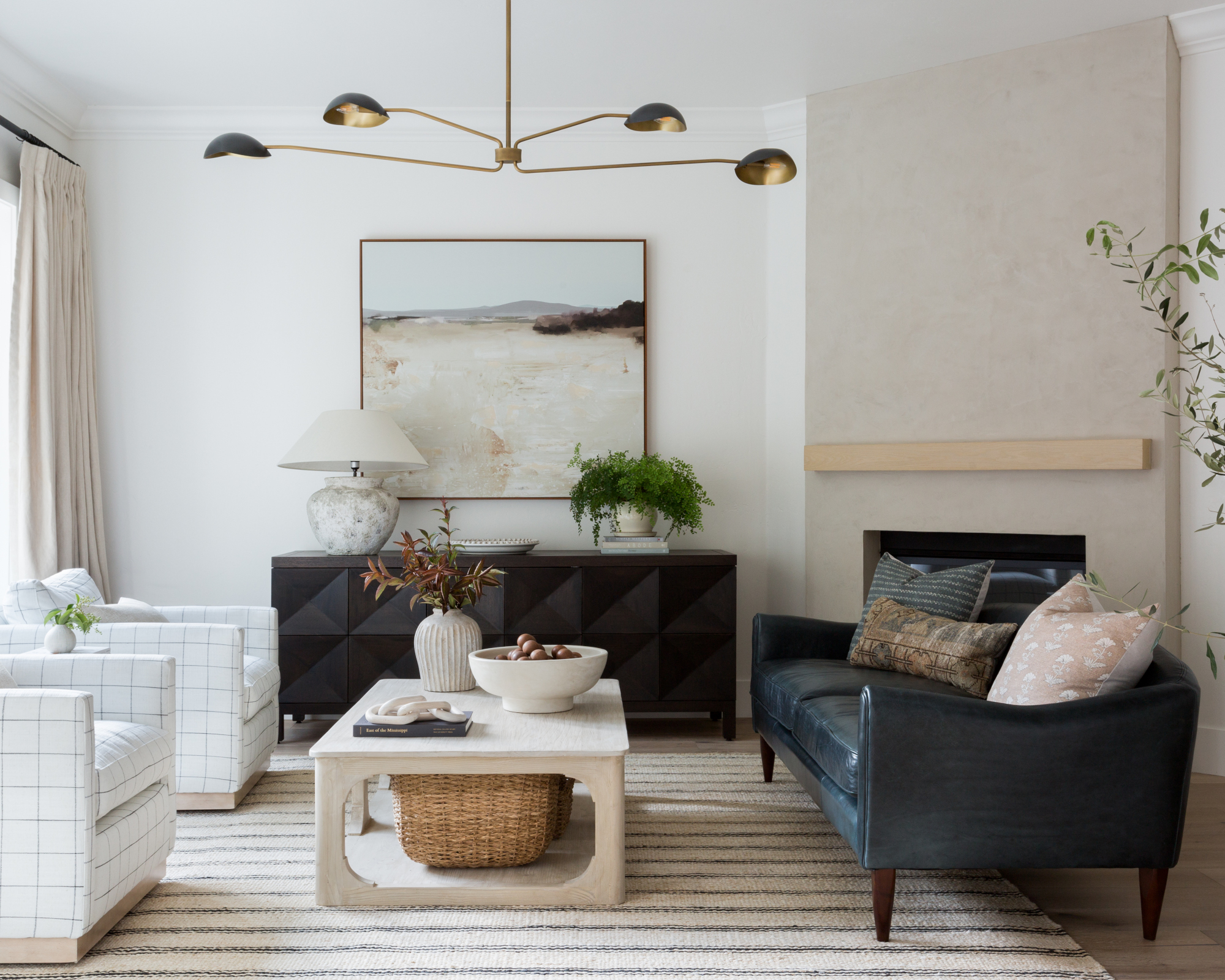
Plants and flowers play an important role in the interior design of any space. However, decorating with plants isn't just about their visual appeal. Known for its ability to reduce stress and in the case of plants, to purify the air we breathe, greenery will give your updated living room a natural boost, bringing the healing and rejuvenating power of nature inside.
How do you do this without buying anything new? Shaolin Low suggests bringing in small potted herbs or plants from your garden. 'Not only do they add a natural and refreshing element, but they also contribute to a healthier indoor environment,' the designer says.
You can even grow new plants especially for the living room by taking cuttings of plants you have elsewhere in the house or asking friends if you can propagate from their collection. If they happen to be among the easiest houseplants to grow from cuttings, it shouldn't be long before you can start to enjoy the new specimens in the living room.
Tennessee-based Amy Mobley of City Hill Design agrees adding greenery to your space is always a good idea, but says you don't need to limit yourself to houseplants. 'You can forage for some cuttings to bring inside—a beautiful tree branch in a tall, sculptural vase can add an editorial touch, while fresh cut flowers can also bring charm,' says the designer.
In the formal living room arrangement above, put together by interior designer Nicole Salceda at Eye for Pretty, plants of different scales are displayed to great effect alongside a vase of foliage.
FAQs
Why update a living room without buying anything new?
There are more benefits to updating a living room without buying anything new, besides saving money. It's partly about flexing our creative muscles and about being resourceful in looking for solutions and taking pride in finding them. Mostly, though, it's about making something unique and putting something of your distinct character into the space.
Designer Özge Öztürk agrees, and says 'This process of upgrading your space can become a journey of its own and you can be the author in it, as well as of it, by creating artworks and sculptures yourself that will add on to its story. You can have a walk and find branches or wild flowers to work with, and reuse the objects that you already have in your place, to create a room that is deeply personal.'
Karen sources beautiful homes to feature on the Homes & Gardens website. She loves visiting historic houses in particular and working with photographers to capture all shapes and sizes of properties. Karen began her career as a sub-editor at Hi-Fi News and Record Review magazine. Her move to women’s magazines came soon after, in the shape of Living magazine, which covered cookery, fashion, beauty, homes and gardening. From Living Karen moved to Ideal Home magazine, where as deputy chief sub, then chief sub, she started to really take an interest in properties, architecture, interior design and gardening.
